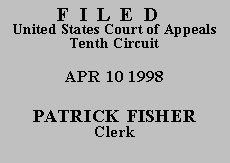

| PERRY ARTHURS,
Plaintiff-Appellee, v. FMC CORPORATION, a foreign corporation, Defendant, ______________________________ GREDE-PRYOR FOUNDRY, INC. Claimant-Appellant. |
|
Appellant Grede-Pryor Foundry, Inc. appeals the district court's order(1) apportioning settlement proceeds pursuant to Okla. Stat. tit. 85, § 44. We have jurisdiction over the apportionment proceeds in this diversity action, see 28 U.S.C. § 1332, under our power to exercise supplemental jurisdiction over matters "'so related to claims in the action . . . that they form part of the same case or controversy under Article III of the United States Constitution.'" Thunder Basin Coal Co. v. Southwestern Pub. Serv. Co., 104 F.3d 1205, 1212 n.7 (10th Cir. 1997) (quoting 28 U.S.C. § 1367(a)).
The facts are not in dispute. Perry Arthurs was working for Grede-Pryor Foundry, Inc. when his arm was caught in the gears of a crane, resulting in amputation of his right arm at the elbow. Mr. Arthurs received workers' compensation benefits provided by his employer, Grede-Pryor. He sued FMC Corporation, the manufacturer of the crane, as well as two entities who had serviced the crane.
The total settlement proceeds were $170,000. The workers' compensation benefits paid as of the date of the hearing totaled $160,178.99, and the parties stipulated for the purpose of this apportionment that Mr. Arthurs' total recovery from workers' compensation would be approximately $600,000. In the litigation against FMC Corporation, Mr. Arthurs incurred expenses exceeding $16,000, and agreed to pay his attorney fifty per cent of the remainder for attorney fees. The district court apportioned the $170,000 fund as follows: $93,161 to Mr. Arthurs' attorney for fees and litigation expenses, $56,839 to Mr. Arthurs, and $20,000 to Grede-Pryor.
On appeal, Grede-Pryor asserts that the magistrate judge (1) gave undue consideration to compensating Mr. Arthurs and too little consideration to Grede-Pryor's subrogation rights; (2) failed to apply the controlling law requiring subrogation; and (3) failed to grant Grede-Pryor a credit against the amount awarded to Mr. Arthurs for workers' compensation benefits to be paid in the future.
There is no dispute that Oklahoma state law controls. In this case based on diversity, we must reach the same conclusion the state's highest court would reach. See Lytle v. City of Haysville, No. 96-3197, 1998 WL 105065, *10 (10th Cir. Mar. 11, 1998). In applying Oklahoma law, we afford no deference to the district court's legal rulings. See Salve Regina College v. Russell, 499 U.S. 225, 238-39 (1991).
Okla. Stat. tit. 85, § 44 provides that where an employee enters into a "compromise settlement" with a responsible third party, and where the employee and the workers' compensation carrier cannot agree on a division of the proceeds, the court shall apportion the proceeds "in such manner as is just and reasonable." The Oklahoma Supreme Court has defined a "compromise settlement" as "a compromise reached by the injured worker against a third party for less than the amount of the workers' compensation award." Prettyman v. Halliburton Co., 841 P.2d 573, 579 (Okla. 1992) (finding no "compromise settlement" because settlement far exceeded workers' compensation award). "[T]he matter of apportionment of Claimant's recovery from the 'compromise settlement' of his third-party action is addressed to the sound discretion of the Trial Court . . . ." Tipton v. Oklahoma Property & Cas. Guar. Ass'n, 859 P.2d 527, 532 (Okla. Ct. App. 1993). "To reverse a trial court on the ground of abuse of discretion, we must find that the trial judge made a clearly erroneous conclusion and judgment, against reason and evidence." Bank of Okla., N.A. v. Portis, 942 P.2d 249, 252 (Okla. Ct. App. 1997).
The parties agree that the proceeds at issue here were the result of a "compromise settlement." The district court considered and balanced the competing interests of Mr. Arthurs to be compensated fully for his injuries and Grede-Pryor to be subrogated for providing workers' compensation benefits. Oklahoma law does not require that the workers' compensation provider receive any particular portion of a "compromise settlement." See Russell v. Bill Hodges Truck Co., 663 P.2d 724, 726 (Okla. 1983) (settlement divided equally between employee and workers' compensation insurer); Kendrick v. Federal Express, 868 P.2d 748, 751 (Okla. Ct. App. 1993) (entire net settlement awarded to employee); Tipton, 859 P.2d at 532 (after payment of employee's attorney fees, residue of settlement proceeds divided equally between employee and workers' compensation insurer). We note that the settlement resulted from the effort and expense of Mr. Arthurs and his attorney without any assistance from Grede-Pryor. See Kendrick, 868 P.2d at 751 (affirming award of all of net proceeds to employee, noting that settlement resulted from effort and expense of employee's attorney). In that litigation, Mr. Arthurs successfully resisted two motions in limine which, if granted, would have been fatal to his case. See id. (noting that employee had to defend two motions to dismiss the underlying litigation). Under the circumstances, we perceive no abuse of discretion in the district court's apportionment of the settlement proceeds.
Grede-Pryor further argues that it is entitled to a credit on its future workers' compensation payments to Mr. Arthurs in the same amount awarded here to Mr. Arthurs, $56,839.00. The requested credit would nullify Mr. Arthurs' settlement award. Because we have concluded that the district court's apportionment order was not an abuse of discretion, we decline to award a credit to Grede-Prior against Mr. Arthurs' portion.
The judgment of the United States District Court for the Eastern District of Oklahoma is AFFIRMED.
Entered for the Court
Circuit Judge
*. This order and judgment is not binding precedent, except under the doctrines of law of the case, res judicata, and collateral estoppel. The court generally disfavors the citation of orders and judgments; nevertheless, an order and judgment may be cited under the terms and conditions of 10th Cir. R. 36.3.
1. The parties consented to proceed before a magistrate judge. See 28 U.S.C. § 636(c).